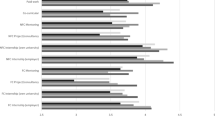Abstract
The effectiveness of supplementary career preparation experiences is conceived as universal or conditional, the latter either enhancing existing assets such as ability or overcoming deficits such as lack of specialized preparation. Logistic regression was used to analyze the responses of 1,012 baccalaureate graduates to a questionnaire survey one month following graduation. Effectiveness was defined as securing baccalaureate level employment. Work experience related to career goals was the only experience of universal effectiveness, with participation in student organizations of marginal significance. Positive conditional effects, however, were found for internships, work experiences related to career goals, advanced skills courses in quantitative analysis and writing, and participation in student organizations. These latter experiences were primarily asset enhancers for those with specialized preparation. An interpretation is offered incorporating labor market conditions and employer behavior as constructs.
Similar content being viewed by others
REFERENCES
American College Testing Program. (1988). CPP Career Guidebook: Planning Your Future. Iowa City, IA: Author.
Becker, Gary S. (1975). Human Capital: A Theoretical and Empirical Analysis, with Special Reference to Education. New York: Columbia University Press.
Biglan, Anthony (1973). The characteristics of subject matter in different academic areas. Journal of Applied Psychology 57(3): 195–203.
Brennan, John (1985). Preparing students for employment. Studies in Higher Education 10(2): 151–162.
Brooks, Linda, Cornelius, Allen, Greenfield, Ellen, and Joseph, Robin (1995). The relationship of career-related work or internship experiences to the career development of college seniors. Journal of Vocational Behavior 46(4): 332–349.
Demaris, Alfred (1992). Logit modeling: practical applications. (Sage University Paper series on Quantitative Applications in the Social Sciences, series no. 07-086). Newberry Park, CA: Sage.
Ducat, Diane E. (1980). Cooperative education, career exploration, and occupational concepts for community college students. Journal of Vocational Behavior 17(2): 195–203.
Fretz, Bruce R. (1981). Evaluating the effectiveness of career interventions. Journal of Counseling Psychology 28(1): 77–90.
Fuller, Rex, and Schoenberger, Richard (1991). The gender salary gap: do academic achievement, internship experience, and college major make a difference? Social Science Quarterly 72(4): 715–726.
Grubb, W. Norton (1992). The economic returns to baccalaureate degrees: new evidence from the class of 1972. The Review of Higher Education 15(2): 213–31.
Hardy, Melissa A. (1993). Regression with dummy variables. (Sage University Paper series on Quantitative Applications in the Social Sciences, series no. 07-093.) Newbury Park, CA: Sage.
Hecker, Daniel E. (1992, July). Reconciling conflicting data on jobs for college graduates. Monthly Labor Review: 3–12.
Herr, Edwin L., and Cramer, Stanley H. (1988). Career Guidance and Counseling Throughout the Lifespan: Systematic Approaches (2nd ed.). Glenview, IL: Scott-Foresman.
Leslie, Larry L., and Brinkman, Paul (1988). The Economic Value of Higher Education. New York: American Council on Education and Macmillan.
Little, Roderick J. A., and Rubin, Donald B. (1987). Statistical Analysis with Missing Data. New York: John Wiley & Sons.
Menard, S. (1995). Applied logistic regression analysis. (Sage University Paper Series on Quantitative Applications in the Social Sciences, Series No. 07-106.) Newbury Park, CA: Sage.
Pascarella, Ernest T., and Terenzini, Patrick T. (1991). How College Affects Students. San Francisco: Jossey-Bass.
Pedro, Joan D. (1984). Induction into the workplace: the impact of internships. Journal of Vocational Behavior 25(1): 80–95.
Richards, Ellen W. (1984). Undergraduate preparation and early career outcomes: a study of recent college graduates. Journal of Vocational Behavior 24(3): 279–304.
Sagen, H. Bradley, Lundak, Gail, and Peterson, Mary (1990, November). Structural discontinuities in the transition from college to work. Paper presented at the Annual Meeting of the Association for the Study of Higher Education, Portland, OR (ERIC Documentation Reproduction Service No. ED 326 123).
Shelley, Kristina J. (1996, Summer). 1994-2005: Lots of college-level jobs–but not for all graduates. Occupational Outlook Quarterly: 2–9.
Spokane, Arnold R. (1991). Career Intervention. Englewood Cliffs, NJ: Prentice-Hall.
Steinberg, Gary (1994, Summer). The class of '90: One year after graduation. Occupational Outlook Quarterly: 11–19.
Taylor, Susan M. (1988). Effects of college internships on individual participants. Journal of Applied Psychology 73(3): 393–401.
Author information
Authors and Affiliations
Rights and permissions
About this article
Cite this article
Sagen, H.B., Dallam, J.W. & Laverty, J.R. Effects of Career Preparation Experiences on the Initial Employment Success of College Graduates. Research in Higher Education 41, 753–767 (2000). https://doi.org/10.1023/A:1007072705601
Issue Date:
DOI: https://doi.org/10.1023/A:1007072705601




